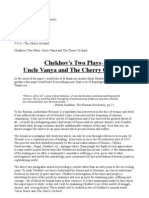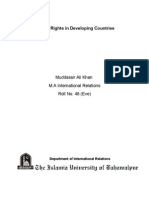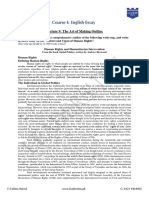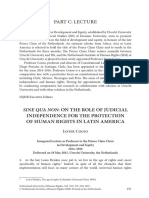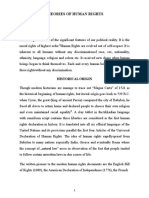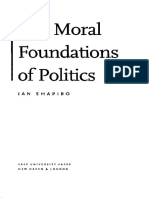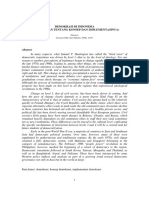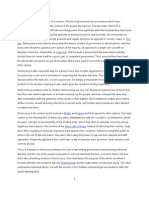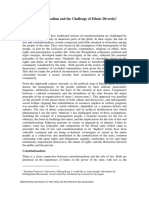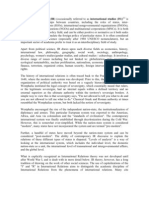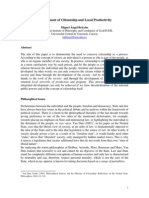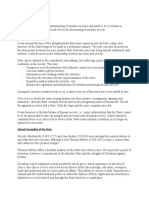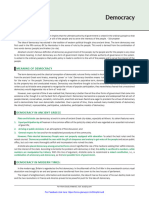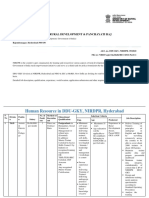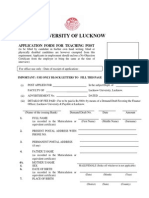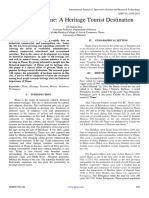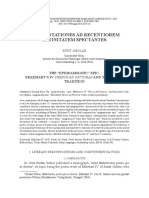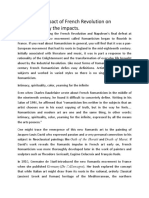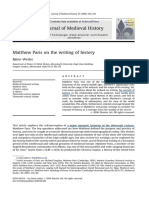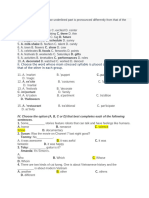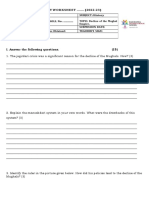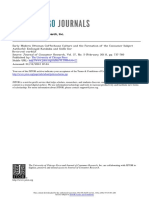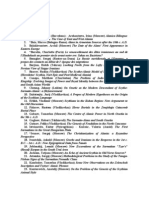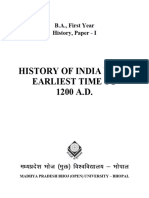Goodhart Intro
Goodhart Intro
Uploaded by
Dr-Shanker SampangiCopyright:
Available Formats
Goodhart Intro
Goodhart Intro
Uploaded by
Dr-Shanker SampangiCopyright
Available Formats
Share this document
Did you find this document useful?
Is this content inappropriate?
Copyright:
Available Formats
Goodhart Intro
Goodhart Intro
Uploaded by
Dr-Shanker SampangiCopyright:
Available Formats
Introduction: Human Rights in Politics and Practice
Michael Goodhart
Chapter Contents
Why Human Rights? 2 The Politics of Human Rights 4 The Practice of Human Rights 5 Human Rights as an Object of Enquiry 6 About this Book 7
Readers Guide
This chapter aims to provide the historical and conceptual background necessary for informed critical engagement with the ideas and arguments presented throughout this book. It begins by considering why human rights have emerged as a particularly powerful and important moral and political discourse since the middle of the twentieth century, stressing their modernity, their invention, and their revolutionary character. It examines the work that human rights do in politics, explaining them as value claims with powerful social, political, and economic implications. Next, it shows why this political character means that human rights play out in complex and divergent ways in practice. This makes human rights difcult to study, as they are inherently multi-faceted and necessarily interdisciplinary. This introduction concludes with a brief overview of the aims, structure, and objectives of the book.
M. GOODHART
Consider the following political events: an authoritarian government silences a critical independent media; rural villagers and the urban poor endure sickness caused by the lack of clean water; criminal networks traffic women and girls for sex; transnational corporations shift manufacturing jobs to low-wage countries with lax labour standards; gay men and women organize to win the right to marry and found families; refugees fleeing tribal or religious violence are denied asylum in nearby wealthy countries; suspected terrorists are captured and detained without trial or review; reformers organize resistance to a repressive military regime; a bombing
campaign halts attacks on local populations by ethnic militias; a campaign eliminates school fees and makes education available for all. What do such disparate events have in common? It would be difficult to talk about any of them without invoking human rights. The decades since the Universal Declaration of Human Rights (UDHR) was approved by the United Nations General Assembly in 1948 have witnessed what one writer aptly calls the rise and rise of human rights.1 Human rights have become so pervasive that it is hard to imagine making sense of, or even talking about, the political world without them.
Why Human Rights?
The advancement of human rights to the forefront of global politics has been as remarkable as it has been improbable. The UDHR, an abstract and non-binding collection of noble words and sentiments, has engendered a vast and growing body of international law that is challenging the ideal of sovereignty and transforming relations among states. This transformation includes the creation and development of a diverse array of international institutions concerned with human rights monitoring, compliance, and, increasingly, enforcement. Human rights have inspired domestic and transnational social movements that have toppled repressive regimes and won protection for oppressed and marginalized people; these movements have emerged as powerful political actors in their own right. While the idea of human rights has provoked sometimes sharp controversy, it has nonetheless become the dominant normative or moral discourse of global politics and a major standard of international legitimacy. Why? Although this text focuses on the post-War era of human rights and on their study within the discipline of politics, understanding the contemporary state of human rights politics and practice requires some sense of their logic and appeal. It would be impossible to summarize the history of human rights here; instead, in the following sections I shall focus on several essential features of human rights that help to explain their emergence and their success, as well as some of the controversies surrounding them. The point of doing so is to provide the historical and conceptual background necessary for informed critical engagement with the ideas and arguments presented throughout this book. Three related features of human rights deserve special emphasis in this respect: human rights are distinctively modern; human rights are a political invention; human rights are inherently revolutionary.
The Modernity of Human Rights
To say that human rights are distinctively modern is not to deny the long history of the values that animate them. Human rights are closely tied historically to notions of justice and human dignity that are as old as human social interaction itself. To stress the modernity of human rights is rather to stress two important contrasts, one with the corporate conception of rights that dominated medieval Europe and many other premodern societies, the other with notions of justice and dignity based in religious cosmology. Medieval conceptions of rights were anchored in social status. Rights pertained to classes or categories of persons rather than to individuals, and they were strongly supportive of hierarchical notions of social organization. The rights one had depended upon and varied with ones status or social position. Rights and
INTRODUCTION
duties defined the social roles that constituted society; they were in this sense conservative (norm-preserving) and stabilizing (order-preserving) features of society. Rights were often also anchored in cosmological conceptions or religious views that interpreted the existing social order as divinely orchestrated, or at least sanctioned. That is, the organization of society, including the rights and duties of different groups of persons, was seen as reflecting a divine will or plan. In Western Europe, where the idea of human rights first emerged in its modern form, this way of viewing society and social organization underwent a profound and sustained transformation beginning as early as the twelfth and thirteenth centuries. The transformation entailed economic development, artistic and literary renaissance, religious reformation, and intellectual flowering. Together, these trends fostered humanism (an emphasis on the achievements and potential of human beings), rationalism (an emphasis on reason and science rather than on belief or superstition), and individualism (a focus on persons, rather than on groups or classes, as the fundamental constituents of society). Modern human rights reflect and embody these humanist, rationalist, and individualist sensibilities. In describing a set of rights that belongs to everyone they make a powerful statement about human capabilities and potential and assert a far-reaching normative programme for protecting and respecting peoples ability to exercise those capabilities and realize that potential. In relying on reason as a foundation or justification, human rights make an appeal to universality that transcends and thus threatenstraditional values and beliefs. Finally, in ascribing the same rights to all persons, the modern conception of rights challenges conventional understandings of social and political order.
(15881679). Hobbes was a devoted monarchist who tried to develop a justification for royal absolutism that would be more persuasive than the divine right of kings, which was increasingly under challenge from theologians and rebellious Parliamentarians. Hobbess key innovation was to suggest that, in a hypothetical state of nature before the creation of society, all individuals should be considered free and equal. Hobbes believed that this natural freedom and equality would result in chaos and war, to which an all-powerful ruler was the logical and best solution (see Hobbes, 1968). Although Hobbes used freedom and equality to justify absolute authority, others quickly saw the potential to put them to other, very different purposes. The most famous and important of them was the philosopher and Whig revolutionary John Locke (16321704). Locke saw that Hobbess arguments about natural freedom and equality had the potential to justify political revolution by making authority depend on the consent of the governed (Locke, 1960). Locke understood this freedom and equality in terms of natural or human rights enshrined in natural law. Government was established, in Lockes view, to provide means to interpret, judge, and execute this natural lawin other words, to protect rights. When it lacked consent or failed to respect and protect rights, Locke argued, government made itself illegitimate and the people had the right to replace it.
The Revolutionary Character of Human Rights
The revolutionary character is the third feature essential for understanding the politics and practice of human rights and the success and controversy they have generated. By the close of the eighteenth century, rights had become a moral standard for assessing the legitimacy of governmental authority and the battle cry of revolutionaries in the United States, France, and Haiti. This revolutionary character is inherent in the logic of rights themselves. As Carole Pateman (1988, pp. 3940) has argued, the simple premise of natural freedom and equality undermines justifications for natural authority and subjection: the doctrine of natural individual freedom and equality was revolutionary precisely because it swept away, in one fell swoop, all the grounds through
Human Rights as a Political Invention
This radicalism indicates that human rights were less the product of evolution than invention (see Minogue, 1979). The idea of rights in Europe can be traced back to its origins and meanings in Roman law (Tuck, 1979), but in seventeenth-century England it became a radical and disruptive notion. This development would have horrified one of the key figures responsible for this change, the political philosopher Thomas Hobbes
M. GOODHART
which the subordination of some individuals, groups or categories of people to others had been justified. This is what Kenneth Minogue (1979, p. 11) meant in describing human rights as the leading edge of the axe of rationalism that toppled monarchies and cleared the ground for democracy. The great revolutions of the eighteenth and nineteenth centuries marched under the banner of human rights precisely because of the power of this argument against monarchy and aristocracy. Yet these human rights revolutions were at best partial and incomplete. Women, labourers, slaves, and natives in areas subjected to European rule were denied the very universal rights that the revolutions themselves proclaimed (see Pateman, 1988; Mills, 1997; Goodhart, 2005). This was as the early proponents of the rights of man had always intended. Their cause was narrowly political, about the empowerment of a small class of landowning gentry chafing under a hereditary monarchy and aristocracy. The logic of consent and natural rights justified their revolution, but in the end it justified much more besides. The logic of human rights extended much further than Locke or his contemporaries could have imagined or endorsed, and over time the axe of rationalism came more to resemble a doubleedged sword, as those excluded from enjoyment of their rights used the logic of universality to challenge their subjection and the hypocrisy that supported it. It is this revolutionary potential and emancipatory logic that make human rights particularly appealing to people struggling against domination and oppression and that explain a large part of their rise and rise.
Appeal and Criticisms
Yet the universal aspiration of human rights is itself double-sided. The failure of human rights in practice to live up to their universal promise has been the source of much of the criticism lodged against them, and this criticism has often been justified. It was perfectly obvious for a long time that who qualified as human in most conceptions of human rights was a fairly narrow group of wealthy European males. The origins of modern human rights in a particular Western social context has fuelled the criticism that they are an essentially Western concept, one at odds with cultural and philosophical traditions elsewhere. This criticism has gained credence thanks to the invocation of human rights in justifying all sorts of dominationfrom colonialism and imperialism to patriarchy, preventive war, and the global neoliberal economic order. Yet human rights have been and remain integral to struggles against sexism, racism, and poverty, and in resistance to colonial and authoritarian ruleprecisely because they challenge any arbitrary or non-consensual grounds for subordination. It is precisely their incompatibility with traditional cultures and philosophies that explains their appeal to those chafing under domination and oppressionas much in the West as elsewhere. As this suggests, human rights are inherently political, and attention to their political character and the politics surrounding them is central to understanding their place in our world.
The Politics of Human Rights
To assert a human right is to make a fundamentally political claim: that one is entitled to equal moral respect and to the social status, support, and protection necessary to achieve that respect. This explains why human rights resonate with notions of justice and human dignity that are ancient and global. Yet human rights are not simply equivalent with human dignity or justice; they represent a certain kind of dignity or justice, one incompatible with subordination. This is why, as the images of the axe and the double-edged sword suggest, human rights imply the levelling of traditional forms of status and hierarchy. Another way of saying this is that human rights are values claims. They express a certain set of political convictions and aspirations concerning the freedom and equality of all people. This makes the politics or
INTRODUCTION
ideology of human rights incompatible with any system of values that regards some persons as naturally or divinely subordinate to others. This point is vital: when opponents of human rights argue that they clash with traditional values or cultures they are perfectly correct. To deny or downplay this clash is to miss what is happening politically when human rights get invoked: power is being challenged, domination contested, authority questioned. The issue is not whether human rights are compatible with existing beliefs and practices around the world; in many instances they are not. The issue is rather whether one endorses the values expressed through human rights or the values underlying beliefs and practices that might conflict with human rights.
Human rights can also be asserted, as I alluded to earlier, as rhetorical or ideological cover for political choices motivated by other considerations. Examples of such behaviour are familiar: European powers justified colonial enterprises as civilizing missions; American politicians cite human rights abuses in launching preemptive military attacks. The rejection of human rights often works in a similar way, as when authoritarian rulers decry human rights as cultural imperialism to secure their grip on power. The important point here is that it is impossible to understand the advantage to be gained from trumpeting or denouncing human rights without understanding what various actors are doing politically when they claim or reject themnamely, taking sides.
The Practice of Human Rights
Human rights are inherently political; they are values claims, and they are embraced or contested to the extent that those doing the embracing or contesting approve of or benefit from the values they embody. I began this introduction by arguing that human rights have in effect become the coin of the realm in global politics, the dominant normative discourse, and a benchmark for legitimate authority. If politics represents the face of that coin, its flip side is the long record of human rights practice that has developed over the past four centuries and accelerated dramatically in recent decades. One can no more understand human rights purely as an abstract political idea than one can understand football by reading the rulebook without watching a match. This practice is evident in the history of social movements, legal developments, political argumentation, institutional consolidation, and public discourse. It represents the real world of human rights, the empirical record of their use by all kinds of people in varied contexts through time. Regardless of what one might think of the philosophical arguments in favour of human rights, there exists this legacy of their actual use and effects in the world that must be reckoned with. Just as it is perfectly possible to be an atheist and still recognize that religion exists and has a real and significant impact on social life, one need not find the moral or philosophical arguments for human rights conclusive or even persuasive to acknowledge that human rights practice is a significant political phenomenon in our world. How widely or narrowly one reads this history of human rights is itself probably determined in large part by where ones ideological sympathies lie (for a very broad reading see Ishay (2004)). Was the democratic political revolution that began with seventeenth-century opposition to monarchy and aristocracy a human rights movement? What about the struggles for labourers and for abolition? Womens rights? Resistance to colonial rule? One way to answer these questions is to try to determine the rhetoric and beliefs of the participants. Another is to argue that what the actors said or thought is less important than the thrust and logic of their arguments. Still another is to focus on outcomes, assessing how these movements contributed to the realization of human rights as we understand them today. There is no correct answer to these questions, because the answers one gives have themselves real political consequences. This is, at least in part, what makes human rights so challenging, so important, and so rewarding to study.
M. GOODHART
Human Rights as an Object of Enquiry
Human rights are an amazingly rich and complex object of political enquiry. Their study involves normative, empirical, and critical approaches and has historical, sociological, anthropological, comparative, and international dimensions. The discipline of politics or political science is concerned with the theory as well as the practice of human rights, with the normative as well as the empirical. Normative political theorists primarily concern themselves with philosophical and policy questions, while empirical political scientists focus primarily on trying to understand how human rights work in the world. Both are crucially important, and they are much more closely related than many people seem to realize. In fact, one of the chief difficulties in the study of human rights is that the normative and the empirical often become blurred. Consider human rights status as a global standard of legitimacy. Political theorists might be concerned with the appropriateness of this standard and with what exactly it entails. These normative questions are distinct from, but closely related to, empirical questions about how human rights came to function as a global standard in the first place and how effectively they work. These questions can be answered in part by tracing the history of the laws and institutions that have evolved over time and of the social actors and movements that advocated their development. Here things get confusing, as such questions direct us back to considerations about what these actors thought they were doing; why, politically, they wanted to do it; the resulting norms to which their actions contributed; and, whether they were right to take up this cause in the first place. Despite these difficulties, some generalizations can be made. Empirical studies of human rights, both qualitative and quantitative, aim to help us understand the reality of human rights politics and practice. These studies might focus on laws, movements, or institutions, or on levels of achievement or violation of human rights standards, trying to uncover the factors that contribute to them. Alternatively, they might seek to trace how the discourse of human rights works to socialize political actors through a combination of pressure and persuasion. Or, they might study the politics of human rights within a particular country or region, trying to explain why certain policies or practices have emerged. They might also focus on how states and other international actors use human rights politicallyas a tool of foreign policy, a condition on aid, and so on. Normative studies of human rights aim to understand the philosophical bases of human rights. They focus on the justifications given for human rights and
TAB LE I.1
Human rights as an object of enquiry. Empirical Normative What ought to be; moral, philosophical, or conceptual questions about human rights Concepts, e.g. democracy, freedom, obligation, rights Arguments, e.g. freedom requires X; one should do Y if Z applies Clarification of key concepts and definitions Justification or moral arguments that support human rights Moral critique or critical evaluation of existing laws, policies, and practices on moral grounds
Scope of analysis Objects of analysis
What is; the practice of human rights in the world Real-world phenomena, e.g. treaties and conventions, institutions, violations, enforcement, social movements, historical records, interviews, opinion surveys, statistical measures Description or observation of what is actually going on Explanation of what accounts for the patterns and relationships in our observations or predicts what is likely to occur
Aims of analysis
INTRODUCTION
on the values that human rights claims embody. Normative studies might track the intellectual development of human rights arguments, clarify concepts (such as freedom), or try to justify a particular way of understanding the human rights or the obligations they entail. They might also critique (endorse or criticize) past or present practice on moral grounds (see Table I.1). Legal and policy approaches draw on the normative and the empirical. One can study the law from an empirical point of view, emphasizing its content,
development, and enforcement, or from a normative perspective, emphasizing its moral character and its interpretation. Similarly, one can try to understand the effects of existing policy or predict the effects of a new policy by relying on empirical analysis, and one can argue for or recommend new policies because of their moral virtues or effects. In practice elements of the normative and the empirical are combined in much of the research on human rights.
About this Book
This book attempts to provide a comprehensive introduction to the politics and practice of human rights from a political perspective. It has two principal aims: to introduce students to human rights, both within the discipline of political science and in the politics and practice of our world; to provide detailed treatment of some key issues in contemporary human rights in ways that simultaneously illuminate those issues and illustrate the approaches that political scientists use in studying them. The book is divided into two parts that reflect these complementary objectives. Part I comprises seven chapters showcasing the state of the art of the study of human rights within political science. These chapters introduce the main approaches to the study of human rights as a political phenomenon and survey the key findings they have yielded. These chapters also highlight the primary challenges and controversies involved in the study of human rights. Part II comprises thirteen thematic chapters written to investigate important topics in contemporary human rights politics and practice. Through the use of varied and extensive case studies, these chapters provide fresh insights into important issues while also providing students with clear examples of how scholars undertake research on human rights. The chapters were all purpose-written for this text by an impressive group of international scholars of human rights. These chapters are representative; they address important themes and issues in the contemporary study of human rights, but they do not exhaust the list of important issues and themes. The chapters reflect a variety of perspectives on human rights; there has been no attempt to have the authors rely on a standard definition of human rights and no requirement that they hold any particular views about them. The chapters also contain significant overlap, with numerous themes, cases, treaties, and institutions being mentioned in several chapters. This diversity and overlap are intentional and serve an important pedagogical purpose, illustrating that there is no one way to understand human rights or to study them.
NOTE
1. Kirsten Sellars (2002). The Rise and Rise of Human Rights. Stroud, UK: Sutton Publishing.
M. GOODHART
ONLINE RESOURCE CENTRE
Visit the Online Resource Centre that accompanies this book for updates and a range of other resources: http://www.oxfordtextbooks.co.uk/orc/goodhart/
You might also like
- Jeanfrancois Chevrier The Adventures of The Picture Form in The History of Photography 1Document22 pagesJeanfrancois Chevrier The Adventures of The Picture Form in The History of Photography 1Carlos Henrique SiqueiraNo ratings yet
- Not Enough: Human Rights in an Unequal WorldFrom EverandNot Enough: Human Rights in an Unequal WorldRating: 3.5 out of 5 stars3.5/5 (5)
- Chekhov's Two Plays - Uncle Vanya and The Cherry OrchardDocument6 pagesChekhov's Two Plays - Uncle Vanya and The Cherry OrchardSandipon ChoudhuryNo ratings yet
- Alexander The Great and The Macedonian Empire - Professor Kenneth W. HarlDocument212 pagesAlexander The Great and The Macedonian Empire - Professor Kenneth W. HarlSonjce Marceva60% (5)
- The Critique of Rights in Cls KennedyDocument50 pagesThe Critique of Rights in Cls KennedyStock SpacesNo ratings yet
- Eric Foner Who Owns History PDFDocument2 pagesEric Foner Who Owns History PDFMichael0% (2)
- Afterword To "Anthropology and Human Rights in A New Key": The Social Life of Human RightsDocument7 pagesAfterword To "Anthropology and Human Rights in A New Key": The Social Life of Human RightsDani MansillaNo ratings yet
- Human Rights in Developing CountriesDocument15 pagesHuman Rights in Developing CountriesMAK9393No ratings yet
- Issues - in - Fundamental - Human - RightsDocument6 pagesIssues - in - Fundamental - Human - RightsKellyNo ratings yet
- Fundamental Human RightDocument22 pagesFundamental Human RightIbrahim Olasunkanmi AbduLateefNo ratings yet
- Human RightsDocument2 pagesHuman RightsAbhishek KumarNo ratings yet
- 1 Evolutions of HumanRights DiscourseDocument41 pages1 Evolutions of HumanRights DiscourseRock Salavadi (Sunny)No ratings yet
- Lecture 9 of Essay by Ms. Fatima Batool at Leaders InnDocument3 pagesLecture 9 of Essay by Ms. Fatima Batool at Leaders InnAbdul Nasir NichariNo ratings yet
- Couso - Role of Judicial Independence For The Protection of Human RightsDocument8 pagesCouso - Role of Judicial Independence For The Protection of Human Rightsmarting91No ratings yet
- Theories of Human Rights - FinalDocument7 pagesTheories of Human Rights - FinalabcNo ratings yet
- The Politics of Human Rights: Feature ReviewDocument14 pagesThe Politics of Human Rights: Feature ReviewFareha Quddus KhanNo ratings yet
- Theories of Human RightsDocument7 pagesTheories of Human RightsDr-Malkah NoorNo ratings yet
- Studying PoliticsDocument20 pagesStudying PoliticsRicardo Aníbal Rivera GallardoNo ratings yet
- BONJE - Chapter 12Document10 pagesBONJE - Chapter 12Hans Gabriel BonjeNo ratings yet
- The Dark Side of The Relationship Between The Rule of Law and LiberalismDocument38 pagesThe Dark Side of The Relationship Between The Rule of Law and LiberalismKaiyuan ChenNo ratings yet
- CITIZENSHIPDocument13 pagesCITIZENSHIPSadhika SharmaNo ratings yet
- BInder (PSIR Topical Test - 6)Document12 pagesBInder (PSIR Topical Test - 6)en20cs301134No ratings yet
- 2018 P1ADocument57 pages2018 P1Asagarika mishraNo ratings yet
- Human Rights Its Importance and SignificanceDocument19 pagesHuman Rights Its Importance and SignificanceHamza Akhtar100% (1)
- (GROVOGUI, Siba N.) Elements of A Postcolonial Human Rights DiscourseDocument31 pages(GROVOGUI, Siba N.) Elements of A Postcolonial Human Rights DiscourseIsadora Veloso BragaNo ratings yet
- Regarding Rights An Essay Honoring The FDocument25 pagesRegarding Rights An Essay Honoring The FmauludiNo ratings yet
- Shapiro, The Moral Foundations of PoliticsDocument231 pagesShapiro, The Moral Foundations of PoliticsMarianoGomezNo ratings yet
- Demokrasi Di Indonesia (Suatu Kajian Tentang Konsep Dan Implementasinya)Document23 pagesDemokrasi Di Indonesia (Suatu Kajian Tentang Konsep Dan Implementasinya)syahriza pahleviNo ratings yet
- Paradoxes Human RightsDocument17 pagesParadoxes Human RightsMiguelNo ratings yet
- Thesis LiberalismDocument8 pagesThesis LiberalismCanYouWriteMyPaperUK100% (2)
- Dustin N. Sharp: Re-Appraising The Significance of Third-Generation' Rights in A Globalized WorldDocument20 pagesDustin N. Sharp: Re-Appraising The Significance of Third-Generation' Rights in A Globalized WorldJames JonestNo ratings yet
- Progressive Traditions4 Humanrights PDFDocument28 pagesProgressive Traditions4 Humanrights PDFnexus1968No ratings yet
- Hoja de Human Rights and Political ThoughtDocument9 pagesHoja de Human Rights and Political ThoughtPablo Pastor MontesinoNo ratings yet
- Fathi UsmanDocument50 pagesFathi Usmanjmohideenkadhar100% (1)
- Crux of Thoeries of IR by Robert Jackson UpdatedDocument6 pagesCrux of Thoeries of IR by Robert Jackson UpdatedSaeed AhmadNo ratings yet
- DemocracyDocument44 pagesDemocracyAshish ChadhaNo ratings yet
- What Are HRDocument7 pagesWhat Are HRAneet PaddaNo ratings yet
- Ghai - Ethnic Diversity and ConstitutionalismDocument23 pagesGhai - Ethnic Diversity and ConstitutionalismOllivellNo ratings yet
- Major Themes To Look For in This ChapterDocument37 pagesMajor Themes To Look For in This ChapterayeshazubairNo ratings yet
- WARREN, Mark E. DemocracyDocument14 pagesWARREN, Mark E. DemocracyDaniel PimentelNo ratings yet
- State and Pol. Obl. - Madhavi SinghDocument6 pagesState and Pol. Obl. - Madhavi Singhmadhavisavitasingh135No ratings yet
- C VCV V VVV VCDocument11 pagesC VCV V VVV VCDouglas Adonaldo Perez TobarNo ratings yet
- Individualism: Social ContractDocument7 pagesIndividualism: Social Contractcarol enconadoNo ratings yet
- 09 Chapter 2Document39 pages09 Chapter 2Choudhary Shadab phalwanNo ratings yet
- Behavioral Science Project Report: HUMAN RIGHTS: Meaning, History, Education and ImportanceDocument41 pagesBehavioral Science Project Report: HUMAN RIGHTS: Meaning, History, Education and Importancevick0049No ratings yet
- LibertarianismDocument28 pagesLibertarianismapi-102485431No ratings yet
- Martin Loughlin, The Functionalist Style in Public LawDocument45 pagesMartin Loughlin, The Functionalist Style in Public LawShreya TiwariNo ratings yet
- 04 Philippine Politics Democratic Ideals and RealitiesDocument22 pages04 Philippine Politics Democratic Ideals and RealitiesKyra Cue67% (3)
- Development of Citizenship and Local ProductivityDocument21 pagesDevelopment of Citizenship and Local ProductivityMiguel Angel Briceño GilNo ratings yet
- Political Theory and ThoughtDocument5 pagesPolitical Theory and Thoughttejukaki0100% (1)
- The Idea of Citizenship in The Latin American DebateDocument13 pagesThe Idea of Citizenship in The Latin American DebatecsojocrNo ratings yet
- Introduction: Human Rights in The Study of Politics: David BeethamDocument9 pagesIntroduction: Human Rights in The Study of Politics: David BeethamHafiz ShoaibNo ratings yet
- Human RightsDocument15 pagesHuman RightsMuhammad AhmadNo ratings yet
- Human Rights Refers To The Concept of Human Beings As Having Universal RightsDocument12 pagesHuman Rights Refers To The Concept of Human Beings As Having Universal Rightsnikhil pathakNo ratings yet
- PDF 30oct23 1255 SplittedDocument2 pagesPDF 30oct23 1255 Splittedsaddamrangrej840No ratings yet
- Liberalism vs. ConservatismDocument10 pagesLiberalism vs. Conservatismcleodees100% (1)
- Fukuyama 2011Document12 pagesFukuyama 2011Gabriela MachadoNo ratings yet
- MHI 02 NotesDocument9 pagesMHI 02 NotesAPA SKGNo ratings yet
- 14_1724258007Document17 pages14_1724258007thesakshi69No ratings yet
- Ooi Kok Hin - Reading Review - Zakaria and Lipset - FinalDocument3 pagesOoi Kok Hin - Reading Review - Zakaria and Lipset - FinalOoi Kok HinNo ratings yet
- IdeologyDocument7 pagesIdeologycleodees100% (1)
- National Institute of Rural Development & Panchayati Raj: Rajendranagar, Hyderabad-500 030Document47 pagesNational Institute of Rural Development & Panchayati Raj: Rajendranagar, Hyderabad-500 030Dr-Shanker SampangiNo ratings yet
- Sainik School SataraDocument4 pagesSainik School SataraDr-Shanker SampangiNo ratings yet
- MSW Ii Sem Syllabus PDFDocument5 pagesMSW Ii Sem Syllabus PDFDr-Shanker SampangiNo ratings yet
- A Study of Bama's Karukku andDocument6 pagesA Study of Bama's Karukku andDr-Shanker SampangiNo ratings yet
- National Conference On Changing Paradigms of Social Work Issues and Concerns 17 - 18 March, 2020Document4 pagesNational Conference On Changing Paradigms of Social Work Issues and Concerns 17 - 18 March, 2020Dr-Shanker SampangiNo ratings yet
- University of Lucknow: Application Form For Teaching PostDocument9 pagesUniversity of Lucknow: Application Form For Teaching PostDr-Shanker SampangiNo ratings yet
- Pluralism and Community: Social Science History PerspectivesDocument1 pagePluralism and Community: Social Science History PerspectivesDr-Shanker SampangiNo ratings yet
- Ragiv Gandhi National Fellowship For ST Candidates2011 - 12Document112 pagesRagiv Gandhi National Fellowship For ST Candidates2011 - 12Dr-Shanker SampangiNo ratings yet
- Rajiv Gandhi National Fellowships For SC Candidates 2011-2012Document334 pagesRajiv Gandhi National Fellowships For SC Candidates 2011-2012Dr-Shanker SampangiNo ratings yet
- PHD Notification 2011Document1 pagePHD Notification 2011Qudratullah ShaikNo ratings yet
- Name: Jay-R N. Gato Date: March 16, 2021 Course: BPED ScoreDocument3 pagesName: Jay-R N. Gato Date: March 16, 2021 Course: BPED ScoreJay-r Gato67% (3)
- Exploring Thane: A Heritage Tourist DestinationDocument6 pagesExploring Thane: A Heritage Tourist DestinationAnonymous izrFWiQNo ratings yet
- Iron AgeDocument14 pagesIron AgeThalesCarterNo ratings yet
- History of Indo Anglian PoetryDocument116 pagesHistory of Indo Anglian PoetrymaayeraNo ratings yet
- 5725 11175 1 SM PDFDocument23 pages5725 11175 1 SM PDFMariana RochaNo ratings yet
- Discuss The Impact of French Revolution On RomanticsDocument4 pagesDiscuss The Impact of French Revolution On RomanticsFaisal GhousNo ratings yet
- Omens of Adversity by David ScottDocument41 pagesOmens of Adversity by David ScottDuke University Press100% (1)
- Art App Midterms (Finale)Document4 pagesArt App Midterms (Finale)Shaira MirandaNo ratings yet
- Lesson Plan History Class 6 (Week 1-14) Warm RegionDocument48 pagesLesson Plan History Class 6 (Week 1-14) Warm RegionAmnah KhanNo ratings yet
- Matthew Paris On The Writing of HistoryDocument25 pagesMatthew Paris On The Writing of History凡邓No ratings yet
- Book Review: Posthuman Urbanism: Mapping Bodies in Contemporary Space by Debra Benita ShawDocument3 pagesBook Review: Posthuman Urbanism: Mapping Bodies in Contemporary Space by Debra Benita ShawÁngel CarriónNo ratings yet
- MaryHenry JournalWritingActivityDocument12 pagesMaryHenry JournalWritingActivityJenny SerranoNo ratings yet
- GIẢI ĐỀ CƯƠNG ÔN THI HK1 LỚP 6Document3 pagesGIẢI ĐỀ CƯƠNG ÔN THI HK1 LỚP 6UsUk english centerNo ratings yet
- Leonard Books of The BraveDocument265 pagesLeonard Books of The BraveavanguarNo ratings yet
- Cities That Influenced The British CultureDocument8 pagesCities That Influenced The British CultureIoana IonitaNo ratings yet
- Ancient Indian Colonies in The Far East Vol 1 1927Document631 pagesAncient Indian Colonies in The Far East Vol 1 1927gaurav soniNo ratings yet
- Arnaudov Dissertation PDFDocument260 pagesArnaudov Dissertation PDFScribdelnautNo ratings yet
- Historical DiscourseDocument225 pagesHistorical Discourseirjalmost67% (3)
- 7th History WorksheetDocument4 pages7th History WorksheetNaman MishraNo ratings yet
- Yuval Noah Harari Argues That AI Has Hacked The Operating System of Human CivilisationDocument7 pagesYuval Noah Harari Argues That AI Has Hacked The Operating System of Human CivilisationCarolina Sourdis100% (1)
- Karaba-Ger-Early Modern Ott Coffeehouse CultureDocument25 pagesKaraba-Ger-Early Modern Ott Coffeehouse CultureDaniela FlorentinaNo ratings yet
- Background and Expectations of The AudienceDocument33 pagesBackground and Expectations of The AudienceLeidelen Muede Maranan100% (1)
- Scythians, Sarmatians, Alans: Iranian-Speaking Nomads of The Eurasian Steppes, Barcelona 2007Document56 pagesScythians, Sarmatians, Alans: Iranian-Speaking Nomads of The Eurasian Steppes, Barcelona 2007pantelchar100% (1)
- Tolerance As An Ideological Category by Slavoj ZizekDocument23 pagesTolerance As An Ideological Category by Slavoj ZizekLeonard BriggsNo ratings yet
- Ethnicity Gender China TibetDocument18 pagesEthnicity Gender China TibetTimNo ratings yet
- History of India From The Earliest Time 122 AdDocument308 pagesHistory of India From The Earliest Time 122 Adrajput989755No ratings yet


